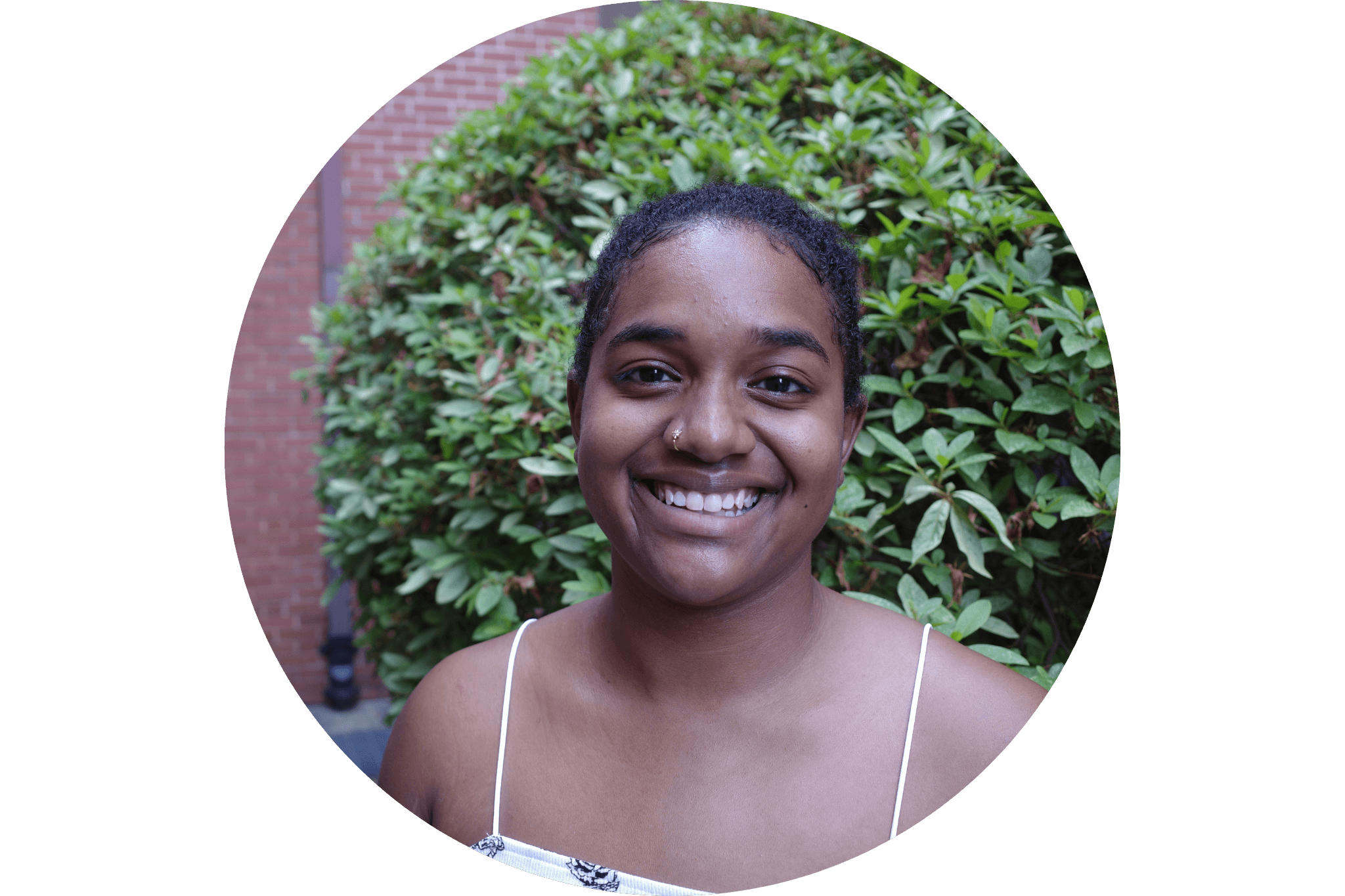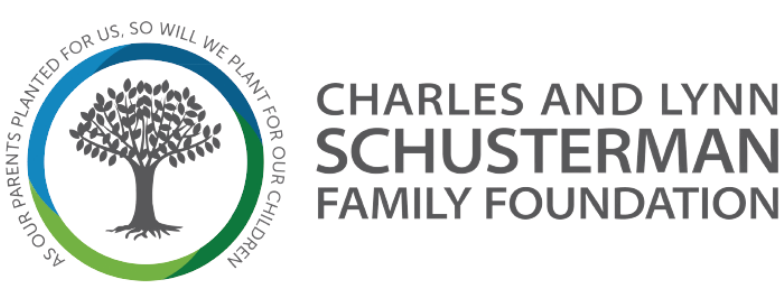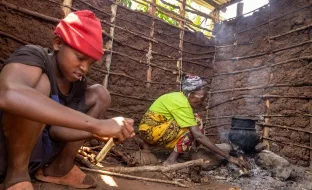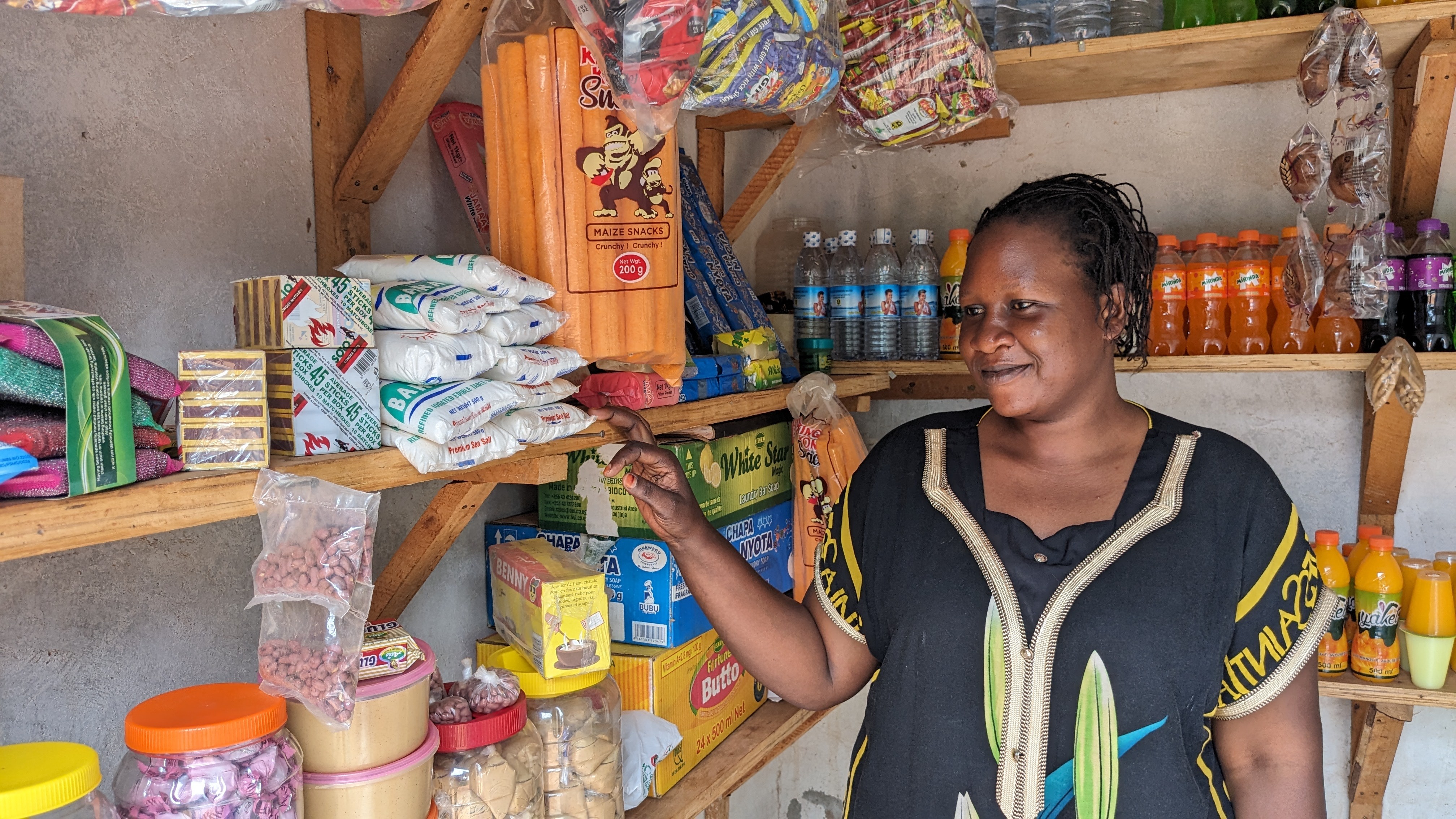IN HER HANDS: GUARANTEED INCOME PROGRAM
Give cash support to low-income women in Georgia
The largest U.S. guaranteed income initiative focused on supporting Black women is expanding. Our goal is to reach 270 more women in Georgia – and we need your help.
Update: Our fundraising campaign is now closed. We’re currently delivering donations to women in Georgia.
Learn more about our work in the U.S. and give directly to other U.S. recipients here.
You can send money directly for women to meet their needs and invest in their futures.
“In Her Hands” is a guaranteed income initiative focused on Black women, led by the Georgia Resilience and Opportunity (GRO) Fund and GiveDirectly.
It is the largest guaranteed income project in the South, and one of the only to span urban, suburban, and rural communities. Since launching in 2022, we have reached 650+ women across Georgia who are receiving an average of $850 monthly for 2 years. The learnings from this pilot are already generating valuable, policy-relevant evidence on the role of cash in supporting increased financial security and wealth building for Black women.
Thanks to generous funding from the Arthur M. Blank Family Foundation and others, we plan to expand the program to women in the English Avenue, Vine City, Bankhead, and Washington Park neighborhoods on Atlanta’s Westside.
Your donations will help ensure we have enough funding to deliver cash to all 270 participants in the first year of the program’s expansion.
First thing I want to do is pay people back for helping me out the past few years. And I want to invest in myself. Pay down past-due bills and my student debt as well.

Giahnni
In Her Hands participant in Atlanta, GA
Your donations have already had proven impacts for Black women and their families.
One year into the program, our research shows that cash has empowered participants to make financial progress relative to those who didn’t receive cash1:
- 🔌 Those who struggled to pay their utility bills on time decreased by 29%
- ☎️ Those facing phone service cutoffs dropped by 27%
- 🍽 Those who were unable to make food last for their families decreased by 20%
- 🏥 Those forced to skip medical care dropped by 17%
- 💰 Average savings rose by $330, while average debt decreased by ~$7,000
To expand the program this year, we need your support. Reaching our fundraising goal will enable us to provide direct cash to 270 more of low-income women in Atlanta’s westside area.
Funders & Supporters





Frequently Asked Questions
What communities does the program serve?
Currently, the project supports women in three communities.
1. Atlanta’s Old Fourth Ward (O4W): The O4W, our first location, is the home of Dr. Martin Luther King, Jr. and Corretta Scott King. Today, it stands as one of the most unequal communities in Atlanta, with nearly 1 in 4 Black residents living below the poverty line.
2. Clay, Randolph and Terrell Counties in Southwest Georgia: Further south, in what was historically “cotton country,” Clay, Randolph, and Terrell County residents make up our rural cohort. Nearly 45% of Black residents in Clay, Randolph, and Terrell counties live below the federal poverty line, compared to 13% of the white population.
3. City of College Park: Finally, the suburban city of College Park constitutes our third location. From 2010 to 2020, the median household income for white families in College Park almost doubled, from $49,000 a year to $87,000 a year. In contrast, Black households have gained only $6,000 – rising from $28,400 a year in 2010 to $34,800 annually in 2020. Given inflation and cost of living increases, it can safely be said that Black households in College Park have not made functional economic gains in at least a decade.
We are expanding in early 2024 to the Atlanta Westside neighborhoods of English Avenue, Vine City, Bankhead and Washington Park.
How do I apply to receive funds?
Applications are now closed.
If you’d submitted an application, you can expect to receive a status update within 6 weeks of when you applied. Status updates will be sent to the email and/or phone number you provided in your application.
How many participants will you enroll?
We’re aiming to deliver cash to 270 participants for 3 years. Expanding In Her Hands to reach 270 additional women requires $14.4M to cover cash transfers, program expenses, and impact evaluation. By supporting In Her Hands now, you’re helping to ensure we can deliver $36,000 to every participant in the program over the next 3 years.
Why is the program focused on Black women?
Black women face more economic insecurity as a result of systemic barriers like pay inequality and fewer economic buffers than nearly any other demographic in Georgia. Black women earn $0.63 on the dollar to white men in Georgia, and 38% of Black women in the Old 4th Ward of Atlanta live in poverty, compared to 26% of Black men and 8% of white women. Black women in Georgia also face uniquely high barriers to wealth creation. Many act as primary caretakers, and must deprioritize health costs or take on debt to cover their family’s basic needs. While people and communities are incredibly resilient and resourceful, Black women are among the most likely group to experience cash shortfalls that make covering basic needs difficult.
We use “women” as an expansive term inclusive of both transgender and cisgender women. Our program is also open to non-binary individuals who wish to participate.
Why cash?
Income stability is a precondition for economic mobility. With evidence from over 300 studies, direct cash assistance is one of the most promising interventions to stabilize incomes. Dr. King called guaranteed income as the “simplest approach” to address poverty. Guaranteed income is unconditional cash assistance for those in need.
Existing social safety nets often make it difficult for individuals to obtain assistance. Strict eligibility criteria, indirect or insufficient aid, and bureaucratic obstacles make it difficult for families to get support that meets their needs when they need it most. These systems are also exclusionary by design, requiring individuals to jump through hoops to prove they are worthy of assistance. The stakes are particularly high for marginalized communities, due to the dominant narrative that poverty is a consequence of individual choices rather than structural barriers.
We are disrupting “business as usual” by promoting assistance that is direct, flexible, dignified, and specifically focused on improving the financial health of Black women. We expect program recipients will be able to spend more on health costs for themselves and their families, pay down debt, and reduce caretaking burdens and trade offs, which will in turn allow them to build income stability and economic security.
Will you be providing financial and literacy training alongside cash?
Conversations with community experts did not identify financial literacy as a core challenge among our prospective recipients. On the whole, Black women reported knowing how to budget and make sound financial decisions for their families. However, many struggle to save money and build wealth on a month-to-month basis because of the instability, insufficiency, and volatility of their income.
It doesn’t matter how well you can budget when your income consistently lags behind the cost of providing for basic needs for yourself and your family. Community members identified recurring cash relief as a key tool to get them “off the hamster wheel” of persistent debt.
What do you expect to learn from this project?
Community-based organizations, policy advocates, and government leaders across the U.S. and other countries are increasingly pointing to guaranteed income as a policy that can make a significant impact in people’s lives. We hope to add to this conversation by studying how guaranteed income can particularly benefit Black women — a population in Georgia that has historically faced disproportionate structural barriers at the intersection of both gender and racial wealth gaps.
The evaluation component of this project will be led by Dr. Leah Hamilton at Appalachian State University and is specifically designed to help us understand the mechanisms by which cash can improve women’s lives and wellbeing. If you’re interested in learning more about our research results, join our email list at the GRO Fund.
In addition, while the first cohorts of In Her Hands were chosen to study the impact of cash on poverty in different types of communities (urban, suburban, and rural), we have a special focus in this case on longevity of the program. That’s why our hope is to complete a three year program – 33% longer than our first round of locations.
How were communities involved in the design of this project?
The GRO Fund model has been developed in coalition with community members, through a 28-member task force, community survey, and listening sessions with local residents in each of the project locations. Members of the community helped to determine key aspects of program design, from the duration to the cash transfer schedule
Before a new cohort is added, GRO will build relationships with community-based organizations and advocates to ensure that all of our work remains grounded in and accountable to the specific needs of the communities in which we’re working.
What is the significance of the name In Her Hands?
Martin Luther King Jr. said of Guaranteed Income in 1967, “the dignity of the individual will flourish when the decisions concerning his life are in his own hands.” Cash in the hands of women means great economic stability for individuals, families, and communities. It means greater agency over her future is in her hands. A black woman often holds much of the financial responsibility of her household in her hands. This program puts funds directly in her hands. And these funds mean her future and her choices are finally in her hands.
The In Her Hands initiative builds on the work of many guaranteed income programs from across the country. Principally, the task force and community members were inspired by the work of Magnolia Mother’s Trust run by Springboard to Opportunities, which is the longest-running guaranteed income program in the U.S. and also focuses on Black women.
Are donations tax-deductible?
Yes, donations are tax-deductible in the United States. GiveDirectly is a registered 501(c)(3), and our U.S. federal EIN is 27-1661997.
We accept all major credit and debit cards, PayPal, checks, wires, stocks, cryptocurrencies, and more. Reach out to us at info@givedirectly.org for more information on ways to give.
If you have any questions about the initiative, please contact GiveDirectly or the GRO Fund.
- Changes are measured between program participants and those in a comparison group composed of eligible applicants who were not selected for the program. ↩︎

